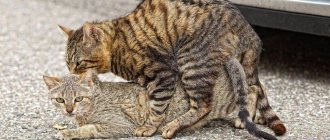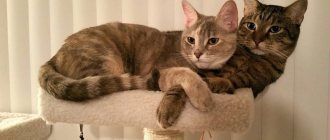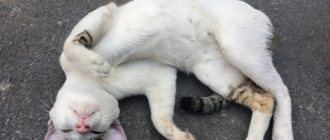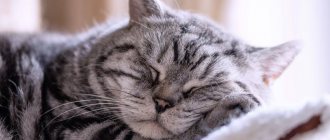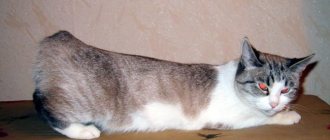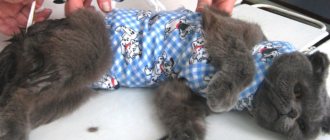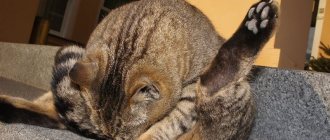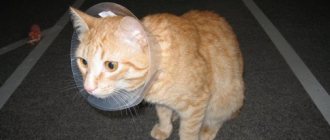Cat owners have different visions for the future of their pet; many plan to undergo surgery to castrate the animal at a certain age. When a cat starts to get excited, wants a cat, or yells, this creates a lot of problems for the family and disrupts peace and relaxation. And the pet itself experiences discomfort.
If no offspring are planned, castration becomes one of the most effective methods for calming the animal. But does it always give the desired result? Sometimes cat owners complain that even after the operation, a neutered cat feels agitated and pesters its owner.
What could be the reason for this behavior, how can I help the cat?
Features of the operation
This operation is common; many cat owners resort to it. After surgery, some changes cannot but occur in the animal’s body. But they are not dangerous to his health. And castration is of great importance, especially for domestic cats.
When a cat periodically tramples and gets excited, screaming loudly at night from his desire, this creates a tense atmosphere in the house. What should owners do in such a situation? As a result, no one brings such a cat a cat anyway, and peace in the family is disrupted for many days.
ATTENTION! The operation, if performed by a good veterinarian, is not dangerous, is carried out quickly, and the recovery time is not long.
The main thing is to properly prepare your pet for surgery and closely monitor it during the recovery period. Castration does no more harm than those hormonal and other pills that would have to be given to an overexcited animal.
The essence of the operation is that the doctor, after making small incisions near the scrotum, will completely remove the testicles or just tighten the seminal canals. Sterilization of cats is a more serious procedure that requires longer rehabilitation, because the cat’s entire uterus is removed.
Emotional component
All this is good, but why do pets from time to time begin to “knead” the sofa with their paws with such frenzy that one cannot suspect echoes of a happy childhood in this habit? It's simple. Just like humans, pets are susceptible to stress.
They didn’t give you food on time, your favorite toy disappeared somewhere, the owner didn’t let you sharpen your claws on his favorite leather sofa... There can be many reasons, but there is only one relief - to stomp around in one place, splashing out your emotions. After such a procedure, the animal often becomes much calmer and can even go to make peace with the owner, even if he offended his cat.
Interesting fact. Some animals get so carried away by petting that they not only lose control of their claws, but can even bite and literally kiss their owner. Some breeders complain that their face is completely covered in cat drool.
Why does he still want a cat after castration?
When cat owners decide to castrate their pet, they expect that the operation will be easy, everything will heal quickly, and long-awaited peace will come to the house. But time passes after visiting the surgeon, the cat was castrated, and he still screams? What's the problem now?
The cat’s owners get upset and don’t know what to do next, how to calm the animal, which again begins to trample and scream. The reason for this behavior may be a violation of the castration deadlines:
- The cat should be taken to a veterinary clinic to see a surgeon for castration before he has his first relationship with the cat. If mating has already taken place, the operation, if it produces results, will obviously not be immediate . A cat that has experienced the pleasure of an intimate date with a cat will continue to produce hormones after castration.
- Owners may notice a boner on a neutered cat; he will mark his territory and yell at night. The pituitary gland continues to transmit signals, and the pet will experience strong excitement. It is important to listen to the recommendations of veterinarians. Including the timing of castration. You need to be patient, after a long time the situation should return to normal.
- The reason for further agitation of the cat may be unsuccessful or incorrect execution of the castration operation . If the veterinarian is inexperienced or illiterate, he may perform a careless surgical intervention that will not give the expected result. In this case, it is important that such an unprofessional procedure does not also become a threat to the cat’s health.
- In many cats, one testis may be located in the abdominal cavity or under the skin. To bandage it, you have to do strip surgery. This phenomenon is called cryptorchidism. An inexperienced veterinarian may not identify this feature of the pet. This once again proves how important it is to choose a specialist correctly for your pet, and to perform operations only in a clinic, and not at home.
- The cat needs to be given time so that he can recover from the operation so that his body begins to work in a new way. When, after a few days, the owners see that the cat’s penis is erect and that he is trampling on a toy, they are immediately horrified, expecting an immediate result of castration.
- The veterinarian who performed the procedure must warn the animal’s owners that the hormonal levels will not decrease immediately; the cat may remain agitated for some time. You should be patient and not irritate yourself or your pet. Sometimes it takes up to a month to rebuild the body, sometimes this period extends longer.
- When the veterinarian simply ties the vas deferens, this simply blocks the release of sperm . But the cat remains a male with all the attendant behavioral characteristics. He will run after the cats, pester the owner, and trample. You need to check with a specialist exactly what kind of surgery is being performed. In this case, the operation is called a vasectomy, it preserves the level of hormones and all the instincts of the cat.
After complete castration, the hormonal levels decrease gradually, you should wait for the result and do not rush to make claims to the surgeon.
Over time, sexual arousal will decrease and occur less frequently.
ATTENTION! If the operation is performed correctly, by a good specialist, the result will definitely be visible.
What should a person do?
If a cat crumples a blanket, a bed or a person with its front paws, this means that it is showing its love, care and affection. The cat comes to share its energy and absorb everything negative. Therefore, it is not worth punishing, shouting or beating animals for such manifestations. Otherwise, the animal will close down, become aggressive and may even begin to take revenge.
If a cat wrinkles a blanket or clothes, purrs and at the same time releases its claws, you should take care of their length. Owners can also resort to other tricks:
- Stroke your pet's paws from above, which will make him hide his claws;
- Place a thick blanket or pillow under the cat's paws;
- While stroking the cat's head, place the cat on its side or back, which will change the force of the impact;
- Distract your cat's attention with a soft toy.
In any case, such actions, especially the soft massage and purring of the cat, speak of his deep feelings, affection and love for the person. But the theory of zoologists that cats are ways to treat humans deserves special attention.
Don't leave your cat alone for long!
They do not need a full bowl of food, but human presence.
The cat sitter will take care of your pet, clean the litter box and make sure the bowls are clean.
Meet the cat
Felinotherapy is a special, therapeutic technique that can be used by anyone who is not allergic to wool. Another interesting ability of animals is to sense a person’s mood and problems. Because of this, the pet can independently come to the rescue and relieve stress. You should not refuse such attention, because the purring of a cat relieves stress and tension and calms the nervous system.
By the way, the purring of a cat helps to thicken the bones, which they use to heal fractures. This is due to the fact that the vibration frequency of sound is from 20 to 50 Hz, which has a good effect on the condition of bone tissue.
Due to the positive effects of purring and cat massage, animals are used to treat schizophrenia, cerebral palsy and autism.
What not to do when a cat tramples a blanket with its front paws:
- Scold and shout;
- Beat and use physical violence;
- Trim nails too short;
- Limit the animal’s impulses to show tenderness and care;
- Abort a cat if she is in heat.
It is necessary to appreciate such animal impulses as the desire to trample the blanket with its paws and massage the owner. Because there are a number of understandable reasons for this, starting with innate instincts and ending with a state of excitement during estrus. There is no need to limit such behavior, and especially not to scold and beat the cat. All you need to do is use a few simple techniques and trim your nails. In addition, paw massage will help relieve tension, relieve pain and even some diseases. Not to mention the charge of positive emotions.
What to consider
- A cat should be neutered before it has the opportunity to mate with a cat.
- You need to think carefully about whether such an operation is really necessary, whether there will be a desire to get offspring from a cat of one breed or another.
- If you decide to undergo castration, it is important to carefully choose a clinic and a doctor. The operation is not complicated and common, but it is still a surgical intervention on the body. It should not be done at home.
- After the procedure, you need to help the cat cope with the condition . You need to be near him as much as possible, if only to calm him down.
- The result of castration may not appear immediately; you need to wait several weeks, sometimes more. Hormonal levels will gradually decrease, and sexual arousal will occur less and less often.
In some cats, sex hormones, testosterone, can be produced in small quantities by the adrenal glands. The amount is really small, but it is enough to excite. What to do in this case.
If the cat does not bother you too much, you can endure some periods. When your pet screams loudly or constantly pesters you, you should give him one of the sedatives specially designed for animals. For example, “Cat Bayun”, known to many cat lovers.
Why do cats trample their paws: answers from experts
Many inexperienced animal lovers often wonder why cats trample their paws. It should be noted that these are very interesting creatures with many traits and behavior patterns unique to this species of animal. An exclusively cat habit is a kind of trampling with its paws in one place. During this process, some breeds completely hide their claws, while others, on the contrary, extend them to their full length.
Why does a cat trample with its paws?
Explanations of this behavior from various experts change quite often, but everyone notices that this is an instinctive trait of all cats. Newborn babies trample their mother's belly in this way to stimulate a greater flow of milk through the nipples. A fairly old theory states that if a cat tramples you with its paws, it means that it was separated from its mother too early. However, simple observations show that all adult individuals “knead”, regardless of whether they live with a mother cat or not.
The third theory is based on the practical aspect. Sweat glands are located on the paws of animals, which allow them to mark their territory in a unique way and serve as a marker for other felines. According to this theory, if an animal kneads its owner's lap, it is not only showing its love, but also marking it as its property.
Anyone who knows the answer to the question of why cats trample with their paws knows that if they get carried away, they can sink their claws deep enough into the delicate skin of a knee or leg. If your pet does this often enough, you can lightly trim his nails. To do this, use a special machine that allows you to carefully pinch off the tip of the claw by 1-2 mm. You can also keep a special towel nearby and place it on your feet every time the cat intends to start kneading its owner with its paws.
Explanations of this behavior from various experts change quite often, but everyone notices that this is an instinctive trait of all cats. Newborn babies trample their mother's belly in this way to stimulate a greater flow of milk through the nipples. A fairly old theory states that if a cat tramples you with its paws, it means that it was separated from its mother too early. However, simple observations show that all adult individuals “knead”, regardless of whether they live with a mother cat or not.
Types of procedures
IMPORTANT! Surgical removal of the testicles or ligation of the seminal ducts is not the only way to solve the problem of an agitated and screaming cat.
Modern technologies in medicine make it possible to solve the issue in other ways:
- Chemical sterilization can be carried out. During this procedure, a special substance consisting of sclerotizing agents is introduced into the thickness of the testes. They lead to the testicle being completely replaced by connective tissue.
- Another modern method is drug sterilization. In this procedure, an implant with a drug that suppresses libido is sewn under the cat's skin. This method does not yet have a clear positive assessment, since the reaction of animals to hormonal drugs may be different.
- Some experts also talk about the possibility of an oncological threat . The positive aspect of medical sterilization is that the implant can be removed, the cat’s testicles are not damaged, he can again become a full-fledged male and have offspring.
- Veterinarians may also offer radiation castration. It sounds scary, but, in fact, the procedure is not dangerous and has no consequences. The testes are simply irradiated with a precisely targeted beam of gamma rays, causing their tissue to die. The likelihood of side effects is minimal, the procedure can be performed without anesthesia, and it is not painful.
With such sterilization, the cat must be restrained as securely as possible; if it twitches, the beam of rays will hit the internal organs, and this is extremely dangerous.
Medical sterilization does not always have an effect; it does not suppress the production of hormones by 100%. If the cat is still interested in cats, you need to ask the veterinarian to change the drug. After all, the body of animals is individual, and it often takes a long time to select the substance that can really help.
Despite the fact that surgical castration, the removal of the testicles, is a real operation and a trauma for the animal, this method is considered the most effective. Therefore, veterinarians often advise resorting to this method. The cat will survive the intervention, recover, and over time the operation will give the desired result.
Trust in the owner
Many cat lovers adhere to the version that this is how the animal expresses its gratitude and love for its owner. This is how they show that they are extremely satisfied. The roots of this habit should be sought in distant childhood: kittens, when they settle on their mother’s belly, alternately move their paws, stimulating the receptors responsible for lactation. So this same action, transferred to adulthood, shows the pacification of the animal.
Scientists call this behavior the “milk step.” It is fixed in animals for life, and they crush not only humans with their paws, but even soft toys and other cats during games.
Important! Only if the cat completely trusts its owner will it knead him with its paws, while purring enthusiastically and strongly. These animals do not behave this way with unfamiliar people and unpleasant representatives of the human tribe.
Of course, the claws released during this game can scratch your skin, but still you shouldn’t scold the cat for this: this is how he expresses his deepest devotion and affection for you, at the same time feeling like a little kitten, protected from all the vicissitudes of fate by his mother.
Mechanism of sexual behavior
Finally, cats often begin to stomp, arch their backs and purr especially loudly in the first days of spring. Nature demands its way, and therefore your pet fulfills the natural reproduction program. By its behavior, the cat shows potential admirers its complacent attitude and signals its readiness to begin the continuation of its kind.
Of course, the claws released during this game can scratch your skin, but still you shouldn’t scold the cat for this: this is how he expresses his deepest devotion and affection for you, at the same time feeling like a little kitten, protected from all the vicissitudes of fate by his mother.
31 Jul 2021 veterinar77 309
Share this post
- Related Posts
- Why is Demodicosis Dangerous in Dogs?
- To what negative temperature can a Stafford live outside?
- Chronic Kidney Failure in Cats Treatment
- How to Drain Fluid from a Chicken's Belly
"Endorphin Junkies"
Oddly enough, while trampling, a cat’s body produces a large amount of endorphin. This hormone promotes a relaxed, complacent state and is a natural stress reliever. Simply put, in this simple way the animal calms down and returns to normal. You have probably seen more than once how a cat, being almost asleep, continues to automatically “stomp” on the sofa or pillow.
If she is not yet sleeping, she often licks herself, paying special attention to the same pads on her paws. This is how the animal produces increased stimulation of endorphin production. Haven’t you noticed how after such a toilet your pet goes to take a sweet nap? Basically, Mother Nature has blessed these miniature predators with a built-in stress and fatigue reliever. Such a mechanism would clearly not harm a person!
